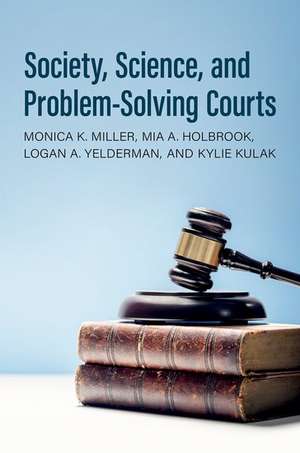Society, Science, and Problem-Solving Courts
Autor Monica K. Miller, Mia A. Holbrook, Logan A. Yelderman, Kylie Kulaken Limba Engleză Hardback – 4 feb 2025
Preț: 278.86 lei
Preț vechi: 361.19 lei
-23% Nou
Puncte Express: 418
Preț estimativ în valută:
53.38€ • 57.100$ • 44.87£
53.38€ • 57.100$ • 44.87£
Carte disponibilă
Livrare economică 19-25 martie
Preluare comenzi: 021 569.72.76
Specificații
ISBN-13: 9780190059804
ISBN-10: 019005980X
Pagini: 352
Dimensiuni: 168 x 242 x 28 mm
Greutate: 0.66 kg
Editura: Oxford University Press
Colecția OUP USA
Locul publicării:New York, United States
ISBN-10: 019005980X
Pagini: 352
Dimensiuni: 168 x 242 x 28 mm
Greutate: 0.66 kg
Editura: Oxford University Press
Colecția OUP USA
Locul publicării:New York, United States
Notă biografică
Monica K. Miller joined the University of Nevada, Reno in 2004 after receiving her J.D. and PhD from the University of Nebraska system. Her interests involve the application of psychological theories and justice principles to laws, policies, and court procedures. Specifically, she is interested in social cognitive biases (i.e., gender and religion-based prejudice) and individual differences in moral and legal decisions (e.g., jury decisions); how the law regulates the family; how community sentiment and science relate to law; how problem-solving courts address social issues; and the well-being of those who interact with the legal system (including the use of therapy dogs).Mia A. Holbrook joined the University of Nevada, Reno in 2019 after receiving her PhD in Criminal Justice and Criminology from Washington State University. Dr. Holbrook's research interests and expertise lie in evidence-based practices and model fidelity; program and policy evaluation; equitable practices in the criminal justice system; problem-solving and specialty courts; organizational trust & collaboration; perceptions & attitudes; and instrument validation.Logan A. Yelderman earned his BA in Psychology and Communication Specialist in 2011 from Baylor University and his PhD in Social Psychology in 2016 from the University of Nevada, Reno. His research interests involve topics at the intersection of social psychology, religion, and law with an emphasis on legal decision-making. His research typically includes experimental and non-experimental designs related to jury and parole decision-making, juvenile drug courts, religious fundamentalism, and the interplay between cognition and emotion.Kylie Kulak earned her BA in Psychology at Fresno State University in 2020, her MS in Psychology at Arizona State University in 2022, and is currently a Social Psychology doctoral student at the University of Nevada, Reno. Her research interests focus on emotions and extralegal factors that can influencejury decision-making, such as race and gender. She also has an interest in the therapeutic effects of facility dogs in the legal system.
